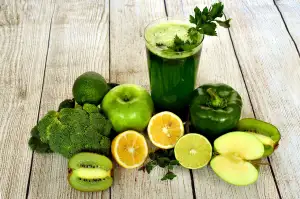Unveiling the Mystery: Why Does Pineapple Cause Mouth Discomfort? - Exploring the Health Effects of Pineapple Consumption

Pineapple, with its juicy and tropical flavor, is a beloved fruit around the world. However, for some unfortunate individuals, consuming pineapple can lead to an uncomfortable sensation in the mouth. This phenomenon has puzzled many food enthusiasts, leaving them wondering why such a delectable fruit could cause discomfort. In this article, we will delve into the mystery behind pineapple mouth discomfort and explore the health effects of pineapple consumption. So, let's unravel this enigma and discover what lies beneath the tangy sweetness of this tropical fruit.
Understanding Bromelain: The Culprit Behind the Pain
To unveil the mystery behind pineapple's mouth discomfort, we must delve into the fascinating world of bromelain. Bromelain is an enzyme found in pineapples that is responsible for breaking down proteins. It is this very enzyme that causes the tingling sensation and discomfort in some individuals after consuming pineapple.
Bromelain has unique properties that make it a powerful digestive aid. It helps break down proteins into smaller peptides and amino acids, facilitating their absorption in the body. However, when it comes into contact with the delicate tissues of our mouths, it can cause irritation and inflammation.
While bromelain is primarily found in the core and stem of pineapples, small amounts may also be present in the flesh. This explains why even biting into a juicy slice of pineapple can trigger mouth discomfort for some people.
The level of bromelain in pineapples can vary depending on factors such as ripeness and growing conditions. Ripe pineapples tend to have higher levels of bromelain, which means they are more likely to cause mouth discomfort.
In addition to its effects on our mouths, bromelain has been studied for its potential health benefits. It has been shown to have anti-inflammatory properties and may aid digestion. However, these benefits are not without potential side effects for those who are sensitive to bromelain.
In the next section, we will explore how exactly bromelain affects our mouths through its enzymatic action and discuss individual reactions to pineapple consumption.
How Bromelain Affects Your Mouth: Enzymatic Action
Bromelain, a powerful enzyme found in pineapple, is responsible for the mouth discomfort experienced by some individuals. This enzyme breaks down proteins, including the ones found in your mouth. When you consume pineapple, bromelain comes into contact with the tissues of your mouth and starts breaking down the proteins present. This enzymatic action can cause irritation and inflammation, leading to a tingling or stinging sensation on your tongue and inside your cheeks. The intensity of this reaction varies from person to person depending on their sensitivity to bromelain. Understanding how bromelain affects your mouth allows you to better manage and minimize any discomfort that may arise from consuming pineapple.
The Sensitivity Factor: Individual Reactions to Pineapple
While bromelain is the main culprit behind pineapple mouth discomfort, it's important to note that not everyone experiences this sensation. The sensitivity to pineapple varies from person to person, with some individuals being more prone to experiencing mouth discomfort than others.
Factors such as genetics, oral health, and overall sensitivity play a role in how our bodies react to bromelain. Some people may have a higher concentration of taste buds or a thinner layer of protective mucous membrane in their mouths, making them more susceptible to the enzymes in pineapple.
Additionally, those with existing oral conditions like canker sores or sensitive gums may be more likely to experience discomfort when consuming pineapple. It's also worth mentioning that certain medications or medical conditions can increase sensitivity to bromelain.
Understanding your own sensitivity level is key in enjoying pineapple without discomfort. If you've experienced mouth pain after eating pineapple in the past, it may be wise to consume it in moderation or avoid it altogether.
By being aware of your individual reaction and taking necessary precautions, you can still enjoy the unique flavor and nutritional benefits of pineapple while minimizing any potential discomfort.
Tips to Minimize Pineapple Mouth Discomfort
1. Pair it with dairy: The enzymes in pineapple can be neutralized by the proteins found in dairy products. Try enjoying pineapple with a side of yogurt or a scoop of ice cream to reduce mouth discomfort.
2. Cook or grill it: Heating pineapple can help break down the bromelain enzymes, making them less potent. Grilling or lightly cooking pineapple before consuming it can help minimize any potential mouth discomfort.
3. Choose ripe pineapples: Opt for fully ripe pineapples as they tend to have lower levels of bromelain compared to unripe ones. Look for pineapples with a golden color and a sweet aroma for a more enjoyable eating experience.
4. Freeze it: Freezing pineapple can also reduce the activity of bromelain enzymes. Enjoying frozen pineapple chunks or using them in smoothies can be a refreshing way to enjoy this tropical fruit without experiencing mouth discomfort.
5. Rinse your mouth: After consuming pineapple, rinse your mouth with water or a mild saltwater solution to help remove any lingering bromelain enzymes from your teeth and gums.
Remember, while these tips may help minimize mouth discomfort, individual reactions may still vary. Listen to your body and adjust your consumption accordingly. Enjoy the unique flavor and health benefits of pineapple, but do so with caution to avoid any unpleasant experiences.
While pineapple is a delicious and nutritious fruit, it can also cause mouth discomfort for some individuals. The culprit behind this discomfort is bromelain, an enzyme found in pineapple that breaks down proteins. When consumed, bromelain can cause a tingling or burning sensation in the mouth.
However, it's important to note that not everyone experiences this discomfort. Some individuals may have a higher sensitivity to bromelain, while others may not be affected at all. It is crucial to listen to your body and pay attention to any adverse reactions when consuming pineapple.
To minimize pineapple mouth discomfort, there are a few tips you can follow. Firstly, consider cooking or grilling the pineapple as heat can help deactivate the enzyme. Additionally, pairing pineapple with dairy products like yogurt or milk can help neutralize the effects of bromelain.
In conclusion, while pineapple offers many health benefits and is a delicious addition to various dishes and beverages, it's essential to embrace it with caution. Pay attention to your body's reaction and take necessary steps to minimize any potential mouth discomfort. By doing so, you can continue enjoying the unique flavors and benefits of this tropical fruit without any unpleasant side effects.
Published: 13. 01. 2024
Category: Health



